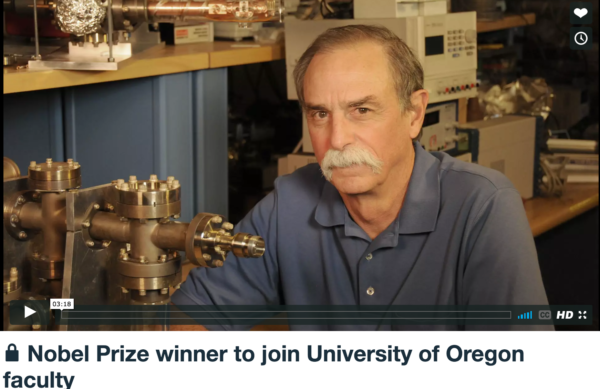Seems he’s pretty well qualified:

Around the O has more here:
- A Nobel for Teasing Out the Secret Life of Atoms (The New York Times)
- Quantum Computing Wins a Nobel (The New Yorker)
- Scientists are close to building a quantum computer that can beat a conventional one(Science Magazine)
- Keeping Better Time With Atomic Clocks: A Live-Blog Event With Nobel Laureate David Wineland (Forbes)
- Quantum Computers Ready to Leap Out of the Lab in 2017 (Scientific American)
And probably cheaper than another dean…Better way to improve the UO’s standing. Less dean’s, more endowed chairs.
Fewer. Fewer deans.
And fewer, fewer apostrophes used wrongly to indicate plurals.
But I agree with the sentiment.
This is a really big deal for UO!
I would like to think the money comes from private giving, not outsized tuition hikes or layoffs of hapless liberal arts adjuncts.
I assume this is the first success of the new Knight Campus millions. And rumour down at the faculty club is he’s taking the job as an NTTF. Which ought to get them a bit more respect from JH. Not a bad start …
Merit pool for the NTTFs just doubled.
I’m not so sure. His current employer, the National Institute of Standards and Technology, doesn’t think much of efforts to measure research excellence, such as Brad Shelton’s “budget metrics” exercise:
“Dave is universally respected, even revered, at NIST. His impact is too profound to measure even for us, and we’re measurement experts,” said [NIST Acting Director Rochford].
https://www.nist.gov/news-events/news/2017/08/nobel-laureate-wineland-leave-nist-accepts-position-university-oregon
Fantastic! This is great news. Next step is to hire a young scientist who has yet to do all the work that will earn her a Nobel Prize.
I agree. Alas, you might actually have to provide her with the resources and supportive environment to do that research, instead of the economical Oregon Way of just telling her to “be excellent” while offering nothing (or even roadblocks!) Much easier to simply hire someone whose past institutions gave all the support necessary for “excellence”.
Hippo, that is just not true. UO is routinely offering science startup packages in the million dollar range, a little lower perhaps. Some in the multi-million range. We are competitive with schools in our class.
Now, can we compete with NIST? I wouldn’t claim that. Harvard, MIT? Berkeley? No. Maybe the Knight campus will be different.
You want to endow a $500 million faculty research fund? It would go a long way.
point missed
1) yes were are competitive on startup packages, else we could not successfully recruit
2) We are definitely NOT competitive in terms of on going institutional support after startup – we expect these “expensive” startups to bring in more federal money to pack back the startup cost.
The right metric for this is, say for 1M startup – how long does it take that person to generate the equivalent 1M in IDC return?
I succeeded in that pay back metric long ago (mostly because of luck) but the higher the startup, the less likely that IDC payback will be commensurate
Ah, you want ongoing support through a person’s career. Pretty scarce at Oregon. But where would the money come from? If payback from grants isn’t even enough to cover startup.
once again, bad interpretation of what I want and again unwarranted assumptions
1. I have been at several other research Universities (eventually I get thrown out)
2. There are funding cycles – at all these other Universities they offer bridge support until the next successful round of grants (in some cases, have to pay back some of that bridge out of redirected overhead or costshare) but the point remains is that the bridge exists which helps researchers maintain momentum during down funding times (which are quite real)
3. I never said “I want funding through a person’s career” – your making that up – I want insitutional support for established programs that are temporarily in a down funding cycle – else the program (and the PI) will vanish – Andy Bergeland is a recent example of this.
4. There is no bridge at the UO – established researchers leave, as I am in the process of doing now, but too slowly for some.
dog, you highlighted lack of “on going institutional support after startup.”
Trying to understand what you are getting at, I then replied about lack of “ongoing support through a person’s career,”
And then you fault my interpretive skills!
I agree that bridging/revamping money would be useful. It would cost money, though. Where from? I invited Hippo.
A nice research endowment dedicated to that would be nice. It wouldn’t cost that much — not $500 million. Not $50 million.
No
you explicitly said this
“Ah, you want ongoing support through a person’s career”
that is not what I want – I do want bridge money to come from
central support to sustain research momentum during down funding cycles. Period.
I would think he wouldn’t leave NIST unless their explicit promises of resources for new faculty so she (or he) can succeed. I bet they are telling him they want this facility to be the new leader in quantum computing/applied physics and engineering.